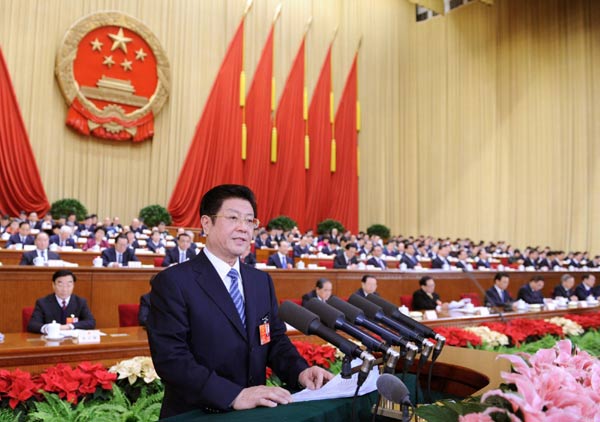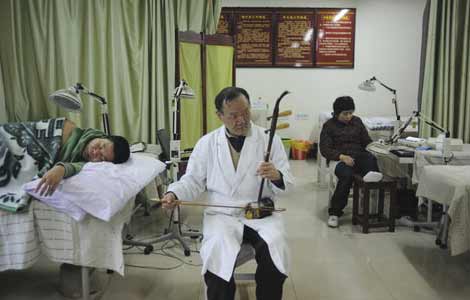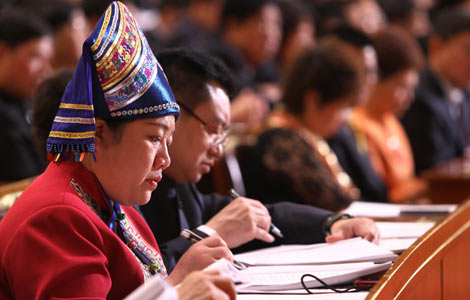 |
|
|
|
|||||||||||
 |
|
Wang Zhaoguo, vice-chairman of the National People's Congress (NPC) Standing Committee, speaks during a plenary meeting during the annual session of the 11th NPC at the Great Hall of the People in Beijing, Mar 8, 2012. [Photo/Xinhua] |
China's legislature has underlined the principle of "respecting and safeguarding human rights" by explicitly writing it into a draft amendment to the nation's Criminal Procedure Law.
The draft was submitted Thursday to the ongoing 5th session of the 11th National People's Congress (NPC) for third reading.
Explaining the draft to a plenary meeting of the legislative session, Wang Zhaoguo, vice chairman of the NPC Standing Committee, said although the current Criminal Procedure Law fully embodies the principle of human right protection in designing procedures and in its specific provisions, it is necessary to clearly write the article into the law.
"Considering that the system of criminal justice involves citizens' fundamental rights such as personal freedom, explicitly writing 'respect and safeguard human rights' into the Criminal Procedure Law not only helps better reflect the socialist nature of the judicial system of our country, but also helps judicial organs observe and implement this constitutional principle in criminal proceedings," Wang said.
China's current Criminal Procedure Law was enacted in 1979 and amended in 1996.
The current revision was submitted to the NPC Standing Committee for first reading in August 2011 and for second reading in December 2011.
Wang said it is necessary to revise the law to strengthen punishment of crimes and protection of the people, to strengthen and make innovations in social administration and maintain social harmony and stability, and to deepen judicial system reform.
Since China is in a transition period with prominent incidence of conflicts, the number of criminal cases remains large and severe violent crimes are on increase, Wang said.
It is of great importance to revise the Criminal Procedure Law in good time and try the best to safeguard public security, resolve social conflicts and solve outstanding problems that people are deeply disturbed about, he said.
China's criminal justice system should be improved step by step based on the country's reality, he said.
"Improvements should be made to keep up with the times without surpassing the realities in the present stage or blindly copying any foreign judicial and litigation systems," he said.
Preventing torture of suspects
Over the past 16 years since the last revision, China's economy and society have developed rapidly and new situations have emerged in regard to criminal offenses, Wang said.
"The development of democracy and legal system in China and people's increased legal awareness have placed higher demands on safeguarding justice and protecting citizens' rights," he said.
The draft amendment, for the first time, has made clear that confessions extorted through illegal means, such as torture, and testimony of witnesses and depositions of victims obtained illegally, such as by violence or threats, should be excluded during the trials.
To institutionally prevent extortion of confession by torture, the draft has regulated that suspects shall be sent to a detention facility for custody after being detained or arrested and be interrogated there. The process of interrogation shall be audio or video-taped.
"We have seen a number of cases where the defendants were wronged because of confessions extorted by torture," said Wang Jiancheng, deputy dean of the Law School, Peking University.
The ban against such abuse of power in interrogation have not been well implemented mainly because the confession obtained through illegal means can still be evidence, Wang said.
"The revisions on ruling out illegal evidence and strictly regulating the procedure of collecting evidence will effectively curb torturing practices," he said.
Reviewing death penalty
The draft amendment also specifies the procedures for the Supreme People's Court to review death penalty cases in order that such cases will be handled "with sufficient care" and "legal oversight" will be strengthened over the reviewing.
According to the draft, the supreme court shall issue an order approving or disapproving a death sentence after reviewing it. If the supreme court overrules the death sentence, it may remand the case for retrial or revise the judgement thereof.
During the reviewing proceedings, the supreme court may question the defendant and the defense attorney's opinions shall be heard if he so requests, according to the amendment.
Under the current law, all death sentences should be submitted to the supreme court for review.
Defining house surveillance
The draft amendment defines the measure of house surveillance and stipulates the conditions for its application.
For example, a seriously ill person, a pregnant woman or a breastfeeding mother, involved in criminal cases, can be put under house surveillance.
Meanwhile, the draft amendment provides that for a suspect involved in the crime of endangering national security, terrorism or especially serious bribery, house surveillance may be carried out at a designated place, upon approval by the procuratorate or public security organ at the next higher level, if house surveillance in his own residence may obstruct investigation.
However, the venue can not be a detention house or a place used especially for handling criminal cases.
The draft also strictly limits exceptions to the provisions of notifying family members of the suspect after a coercive measure is adopted.
Wu Ying, iPad, Jeremy Lin, Valentine's Day, Real Name, Whitney Houston, Syria,Iranian issue, Sanyan tourism, Giving birth in Hong Kong, Cadmium spill, housing policy

|

|

|

|

|

|